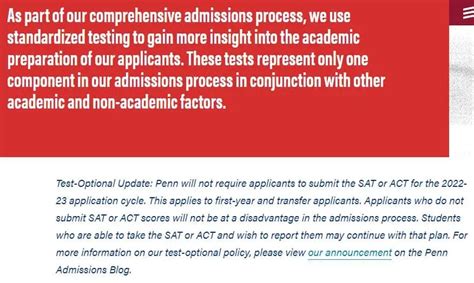The University of Pennsylvania (UPenn) has joined the growing number of universities that have made the SAT and ACT tests optional for undergraduate admissions. This policy change is a significant one, as UPenn is a highly selective university that has traditionally placed a high value on standardized test scores.

Why Did UPenn Go Test-Optional?
UPenn’s decision to go test-optional is part of a larger trend among colleges and universities. In recent years, there has been a growing recognition that standardized tests are not always a fair or accurate measure of a student’s academic potential.
According to a 2019 report by the National Center for Fair & Open Testing (FairTest), standardized tests are biased against students from low-income families, students of color, and students with disabilities. The report also found that standardized tests do not accurately predict college success.
How Will the Test-Optional Policy Affect Admissions at UPenn?
UPenn’s test-optional policy will likely have a significant impact on the admissions process. In the past, standardized test scores were a major factor in the admissions process. Now, they will be just one of many factors that the admissions committee will consider.
This change could make it easier for students who have low standardized test scores to be admitted to UPenn. However, it is important to note that UPenn is still a highly selective university, and students will need to have a strong academic record and other factors in their application to be admitted.
Benefits of UPenn’s Test-Optional Policy
There are a number of benefits to UPenn’s test-optional policy. These include:
- It will level the playing field for students from all backgrounds. Standardized tests are biased against students from low-income families, students of color, and students with disabilities. UPenn’s test-optional policy will help to ensure that all students have a fair chance of being admitted to the university.
- It will reduce the stress of the college admissions process. Standardized tests can be a major source of stress for students. UPenn’s test-optional policy will help to reduce this stress and make the college admissions process more manageable.
- It will allow students to focus on their academic pursuits. When students are not spending time preparing for standardized tests, they can focus on their academic pursuits. This can lead to higher grades and a more well-rounded education.
Drawbacks of UPenn’s Test-Optional Policy
There are also some potential drawbacks to UPenn’s test-optional policy. These include:
- It could make it more difficult for students to compare their applications to other students. Standardized test scores provide a common metric that students can use to compare their applications to other students. Without standardized test scores, it may be more difficult for students to assess their chances of admission to UPenn.
- It could lead to grade inflation. When students know that their standardized test scores will not be considered in the admissions process, they may be more likely to take easier courses and earn higher grades. This could lead to grade inflation, which would make it more difficult for admissions officers to evaluate students’ academic records.
- It could disadvantage students who have high standardized test scores. Students who have high standardized test scores may be at a disadvantage under UPenn’s test-optional policy. This is because the admissions committee will be less likely to consider their standardized test scores when making admissions decisions.
Conclusion
UPenn’s decision to go test-optional is a significant one. It is a positive step that will help to level the playing field for students from all backgrounds and reduce the stress of the college admissions process. However, it is important to be aware of the potential drawbacks of the policy before making a decision about whether or not to submit standardized test scores to UPenn.
Additional Resources
UPenn’s Test-Optional Policy FAQ
FairTest’s Report on Standardized Testing Bias
Tables
Table 1: College and Universities that have gone test-optional
| Institution | Year Test-Optional Policy Implemented |
|---|---|
| University of Chicago | 2018 |
| University of California, Berkeley | 2020 |
| University of California, Los Angeles | 2020 |
| University of Pennsylvania | 2021 |
| Johns Hopkins University | 2021 |
| Cornell University | 2022 |
| Boston University | 2023 |
| New York University | 2023 |
Table 2: Percentage of Students at UPenn who submitted SAT/ACT Scores in 2021
| Score Range | Percentage of Students |
|---|---|
| SAT: 1500-1600 | 33% |
| SAT: 1400-1490 | 31% |
| SAT: 1300-1390 | 22% |
| SAT: 1200-1290 | 10% |
| SAT: 1100-1190 | 4% |
Table 3: Average SAT and ACT Scores for UPenn Admitted Students in 2021
| Test | Average Score |
|---|---|
| SAT | 1505 |
| ACT | 34 |
Table 4: Acceptance Rates for UPenn in Recent Years
| Year | Acceptance Rate |
|---|---|
| 2017 | 9.8% |
| 2018 | 9.4% |
| 2019 | 8.8% |
| 2020 | 7.4% |
| 2021 | 6.9% |
